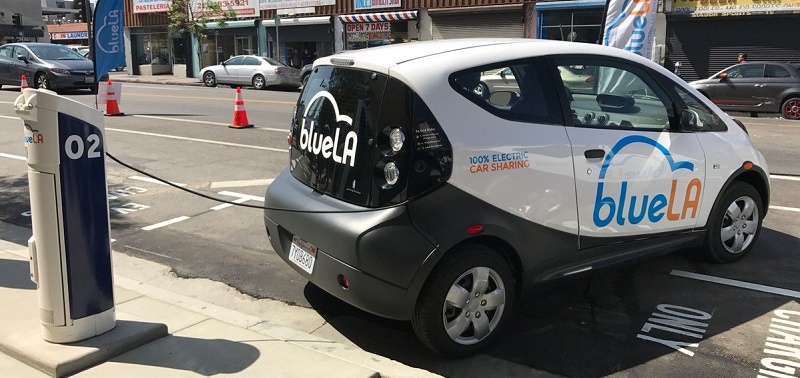The battery indicator light on the electric car industry has shot into the green in recent months as a host of automakers and governments—from GM, Ford and Volvo to China and Paris—have announced plans to go all-in on electric vehicles (EVs). As the world’s largest auto market, China’s plans to do away with internal combustion engines by as early as 2030 could have especially profound impacts on global demand for EVs.
The environmental benefits of widespread EV adoption would be substantial and a major accomplishment. However, simply switching out gasoline-powered cars for electric ones won’t solve for the impact of overconsumption inherent with individual car ownership (*cough, cough, traffic).
That’s where carsharing comes in. Carsharing and other forms of shared mobility can help to reduce reliance on private autos and encourage uptake of more sustainable transportation, thereby further enhancing the positive environmental impacts associated with EV use.
Consider that when you combine two drivers into one shared ride, you halve your emissions and double the efficiency of that trip. A growing body of research also suggests that carsharing can directly reduce long-term reliance on private autos, with each carshare vehicles taking nine to 13 private vehicles off the road by giving consumers confidence to sell or forego the purchase of a car.
Additionally, carsharing can help provide sufficient demand for new charging networks and increase visibility and adoption of EVs by putting thousands of users behind the wheel of new EV models. As the respective benefits of shared mobility and electrification have become clearer, the number of EV carshare programs has continued to grow around the world. Here are five systems to watch:
Maven Gig (Various Locations)
An offshoot of GM’s Maven carshare platform, “Maven Gig” provides weekly car rentals for drivers of services like Grubhub, Uber and Lyft. While drivers are able to choose from a variety of Chevy vehicles, the most popular have been the battery-electric Chevy Bolts. The program launched earlier this year in San Diego and has since expanded to Detroit, San Francisco, LA, Phoenix, Boston, and Washington, DC. The company expects to add 2,000 to 3,000 Bolts for use in Maven Gig as the program expands to new markets.
Blue LA (Los Angeles, CA)
The Shared-Use Mobility Center is working with the California Air Resources Board (CARB) and the City of Los Angeles on a pilot focused on providing shared, electric vehicles residents in disadvantaged LA neighborhoods. The program, BlueLA, launched earlier this year and will ultimately bring 100 electric cars and 200 charging stations to select neighborhoods across the city. The hope is this one-way carshare model can help take 1,000 private vehicles off the road.
The system is operated by Bollore, which also runs Autolib’ (Paris), BlueCity (London), BlueIndy (Indianapolis), and the just-announced BlueSG system in Singapore. Both BlueCity and BlueSG aim to deploy upwards of 1,000 vehicles by 2020, with up to 20% of the charging station network available for public use. Autolib is by far the largest, with more than 4,000 cars in its system.
Affordable Housing EV Carshare Pilots (Sacramento, CA and Portland, OR)
Smaller in scale but still worthy of mention is a program announced earlier that will provide a total of eight electric Kia Souls to residents of three public housing complexes in Sacramento, thanks to CARB funding and a partnership between the Sacramento Housing and Redevelopment Agency, Mutual Housing California, the Sacramento Municipal Utility District, the City of Sacramento, Policy in Motion and Zipcar.
A similar partnership between EV advocacy group Forth (formerly Drive Oregon), local utility Pacific Power and the Hacienda Community Development Corporation has also located three used Honda Fit EVs and chargers at Portland’s Vista de Rosas affordable housing apartment complex. The pilot program makes offers daily electric car rentals for $10 to $12 through peer-to-peer carshare operator Turo.
Volkswagen Green City Initiative (Sacramento, CA)
As part of its high-profile settlement with regulators over its diesel emissions scandal, Volkswagen has agreed to provide $14.7 billion to states over the next 10 years to promote zero-emission transportation. The automaker’s campaign, Electrify America, announced this July that it will commit $44 million over the next two years to building out a network of EV charging stations in Sacramento. The infrastructure is intended to support an EV carsharing program, as well as electric delivery vehicles and taxis. Electrify America is expected to begin installing charging stations in early 2018, with talk already of expanding to the nearby city of Fresno.
Emov (Madrid, Spain)
In December 2016, Madrid gained an electric carshare service with Emov. One of several similar ventures in Europe—including another recently announced program in Madrid, Zity—the program made headlines for its massive popularity: more than 100,000 customers joined in the first five months. The free-floating, one-way carshare program allows users to take advantage of free parking provided to electric vehicles, part of an aggressive effort to curb emissions in Spain’s capital. Emov is a collaboration between the carsharing platform Vulog and PSA, the auto manufacturer behind Peugeot. Emov will operate with 500 of the PSA’s C-Zero battery electric cars. The program is set to expand to other European cities, as well as eventually to the U.S.
For more information on EV carsharing, and to keep up on the latest trends across the shared mobility industry, be sure to sign up for our weekly newsletter, the Mobility Hub.



